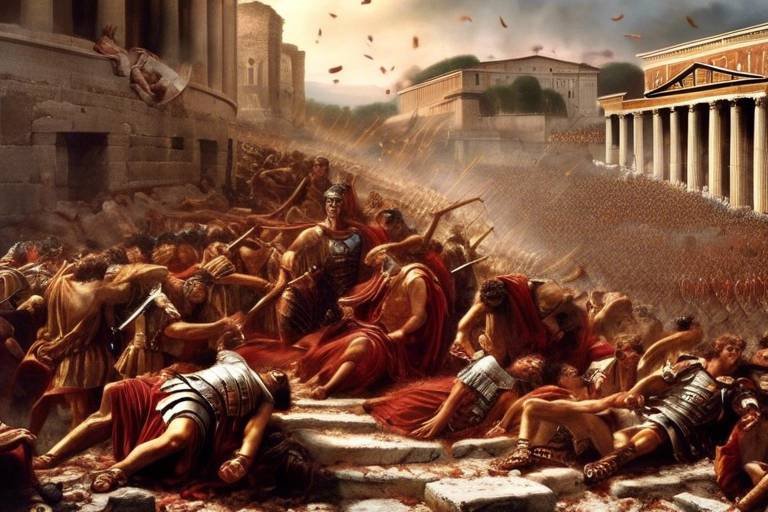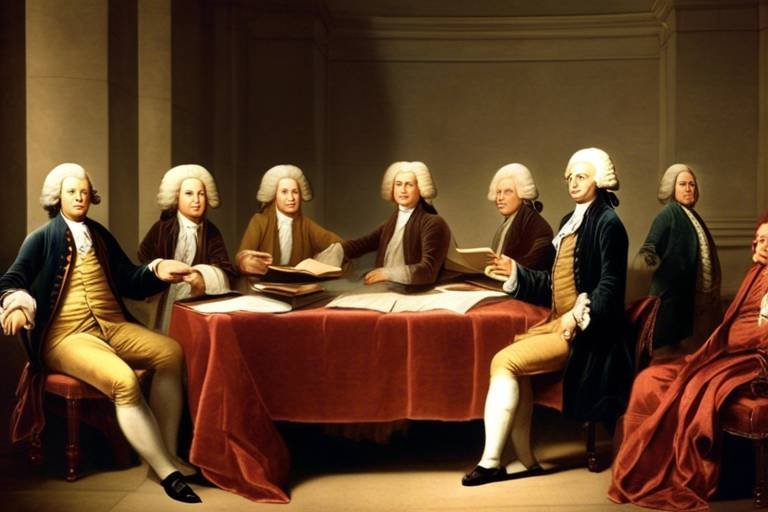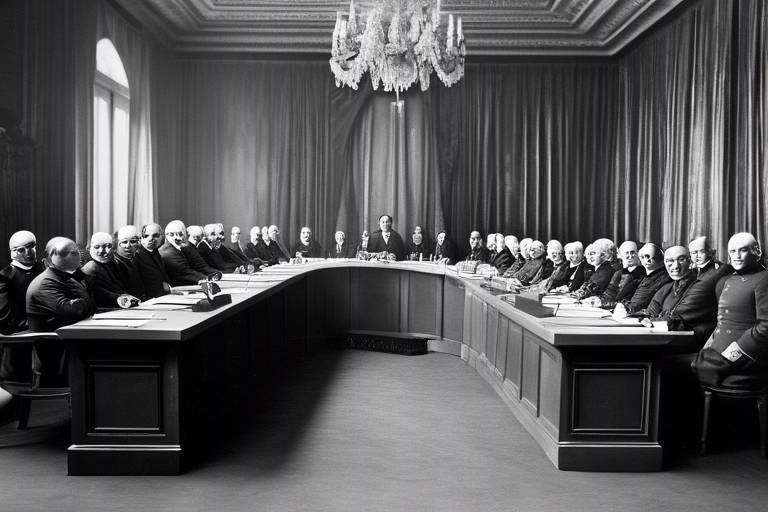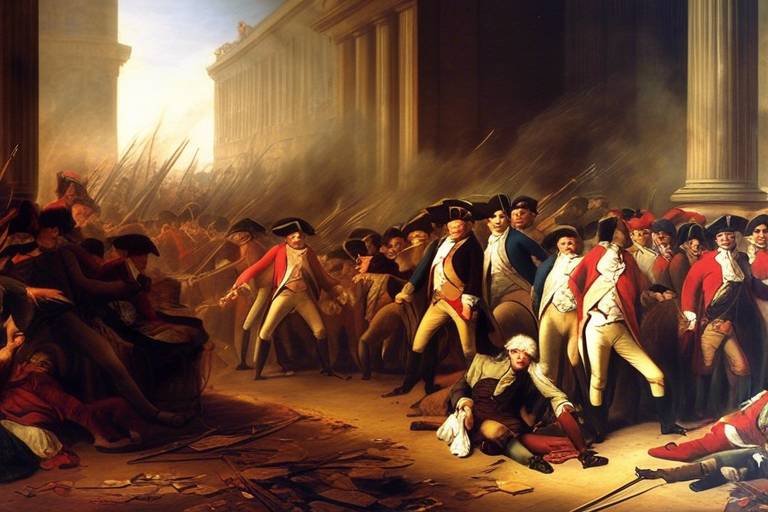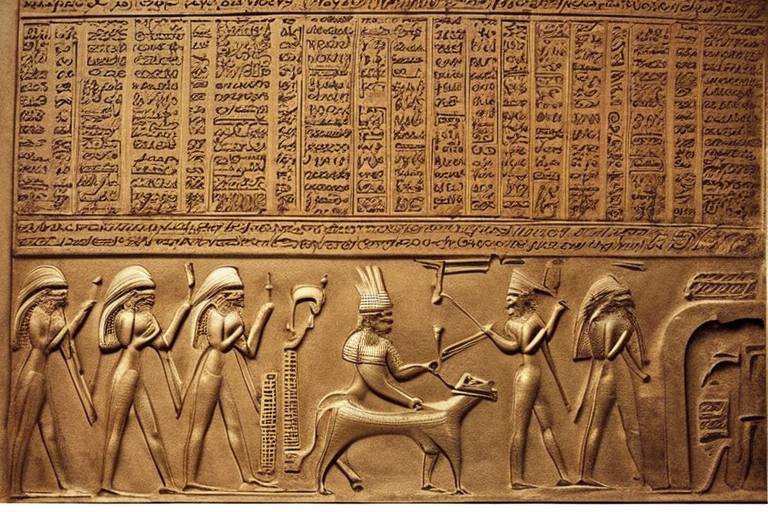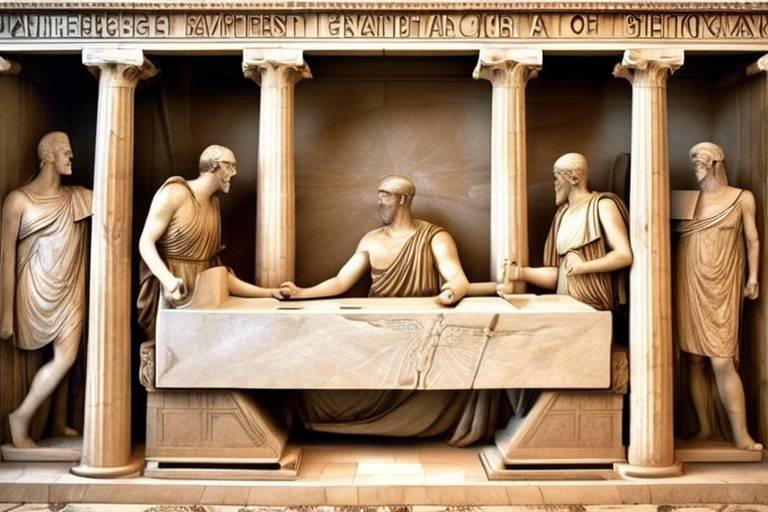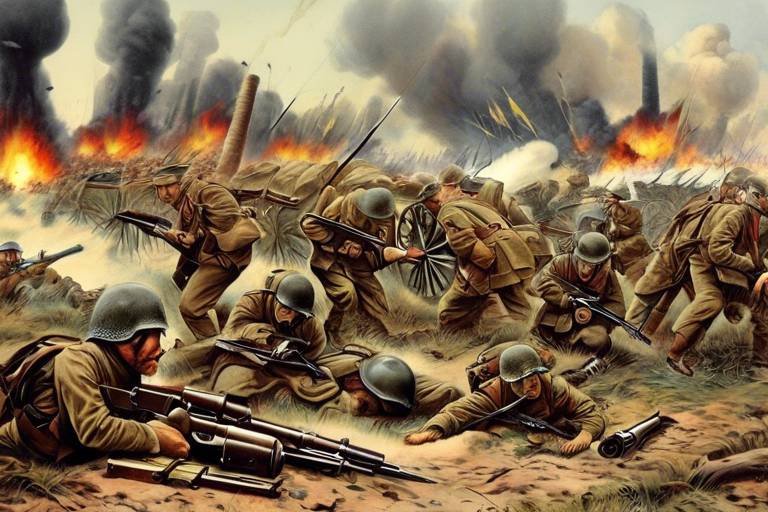The Trojan War - Myth or Reality?
The Trojan War, a legendary conflict that has captured the imagination of people for centuries, stands at the crossroads of history and myth. The question of whether the Trojan War is a mere product of storytelling or a real event that shaped ancient civilizations continues to spark debate among scholars and enthusiasts alike. As we journey through the layers of time and narrative, we peel back the veil of mystery surrounding this epic tale to uncover the truth buried within.

Origins of the Trojan War
The origins of the Trojan War are shrouded in myth and legend, making it a captivating topic for historians and enthusiasts alike. One of the most well-known accounts of the war comes from Greek mythology, where the conflict was sparked by the abduction of Helen, the wife of King Menelaus of Sparta, by Paris, a prince of Troy. This act of betrayal set off a chain of events that led to a full-scale war between the Greeks and the Trojans, with various gods and goddesses taking sides and influencing the outcome.
According to ancient sources, the Trojan War was not just a simple battle between two factions but a complex web of alliances and betrayals. The Greek forces, led by Agamemnon, assembled a formidable army that included legendary warriors like Achilles, Odysseus, and Ajax. On the other side, the Trojans, under the leadership of Hector and aided by the gods Apollo and Aphrodite, defended their city with equal determination.
While the abduction of Helen is often cited as the immediate cause of the war, some accounts suggest that underlying tensions and power struggles between the Greeks and the Trojans played a significant role in the conflict. The epic poem, The Iliad, attributed to the ancient Greek poet Homer, immortalizes the heroes and events of the Trojan War, painting a vivid picture of the glory and tragedy that unfolded on the battlefield.
Modern scholars and archaeologists have long debated the historicity of the Trojan War, with some arguing that it was purely a work of fiction, while others point to archaeological evidence unearthed at the site of Troy as proof of a real conflict. The discovery of the ancient city of Troy in modern-day Turkey has fueled speculation about the true origins of the war and the extent to which it was embellished in myth and storytelling.
Regardless of its historical accuracy, the Trojan War remains a timeless tale of love, betrayal, and heroism that continues to captivate audiences around the world. Its legacy lives on in literature, art, and popular culture, ensuring that the story of Troy and its legendary heroes will never be forgotten.

Key Players in the Conflict
When delving into the epic saga of the Trojan War, it is impossible to overlook the key players who shaped the course of this legendary conflict. From valiant heroes to cunning strategists, each character brought a unique element to the battlefield, leaving a lasting impact on both history and mythology.
At the forefront of the Greek forces stood Achilles, the invincible warrior whose wrath and prowess in battle were unmatched. His duel with Hector, the noble prince of Troy, remains etched in the annals of ancient lore as a defining moment of the war.
Hector, on the other hand, embodied the ideals of honor and duty, defending his city with unwavering courage against the relentless Greek onslaught. His tragic fate at the hands of Achilles symbolized the inevitable clash between heroism and fate.
Leading the Greek coalition was Agamemnon, the ambitious king of Mycenae whose quest for power and glory propelled the armies to the shores of Troy. His complex character and turbulent relationships with fellow warriors added layers of intrigue to the narrative.
Meanwhile, the catalyst of the war, Paris, the prince of Troy whose fateful love affair with Helen of Sparta sparked the conflict, embodied the themes of passion and betrayal that reverberated throughout the ancient world.
These key players, among others, navigated the treacherous waters of war, their decisions and actions shaping the outcome of the legendary battle that would echo through the ages. Their stories, immortalized in myth and history, continue to captivate audiences with their timeless themes of heroism, tragedy, and the enduring struggle between gods and mortals.

The Iliad and the Trojan War
The Iliad, attributed to the ancient Greek poet Homer, stands as one of the most renowned literary works detailing the events of the Trojan War. This epic poem provides a vivid portrayal of the heroes, gods, and the intricate web of relationships that defined the conflict between the Greek and Trojan forces. Through the lens of Achilles and his wrath, the Iliad explores themes of honor, glory, and the inevitable tragedies of war.
Homer's depiction of the Trojan War in the Iliad not only serves as a narrative of the battles and struggles but also delves into the complex emotions and motivations driving the characters. The interactions between warriors like Hector and Achilles, as well as the intervention of the gods in mortal affairs, add layers of depth and drama to the epic tale.
Moreover, the Iliad offers insights into the values and beliefs of ancient Greek society, showcasing the importance of heroism, loyalty, and the influence of divine forces on human destinies. The poem's enduring legacy lies in its ability to capture the essence of human nature amidst the chaos of war, resonating with audiences across centuries.

The Iliad,
Exploring the historical and mythical aspects of the Trojan War, one of the most famous conflicts in ancient Greek mythology. Delve into the debate surrounding its existence and significance in history.
Unraveling the various accounts and sources that detail the origins of the Trojan War, including the role of the Greek gods, the abduction of Helen, and the alliances formed by both sides.
Examining the major figures involved in the Trojan War, such as Achilles, Hector, Agamemnon, and Paris, and their impact on the outcome of the legendary battle.
The Iliad, attributed to the ancient Greek poet Homer, is a primary source of information about the Trojan War. This epic poem narrates the events of the conflict, portraying the heroic deeds and tragic fates of the warriors on both sides.
Investigating the archaeological discoveries at the site of Troy in modern-day Turkey sheds light on the historical reality of the Trojan War. Excavations have unearthed ancient ruins and artifacts that provide valuable insights into the ancient city's existence and potential connection to the legendary war.
Exploring the military strategies and tactics employed by the Greek and Trojan forces during the prolonged siege of Troy reveals the cunning and ingenuity of both sides. The construction of the infamous wooden horse, a symbol of deception and victory, is a testament to the strategic thinking of the Greeks.
Discussing the lasting impact of the Trojan War on literature, art, and culture highlights its enduring significance. The epic tales of heroism and tragedy continue to captivate audiences and influence artistic expressions, shaping the cultural legacy of the ancient world.
Examining how the story of the Trojan War inspires contemporary works of fiction, film, and scholarly research underscores its timeless appeal. The themes of love, honor, and warfare depicted in the ancient legend resonate with modern audiences, ensuring the enduring relevance of the Trojan War narrative.
Exploring the pervasive influence of the Trojan War on popular culture reveals its enduring presence in modern entertainment. From blockbuster Hollywood adaptations to immersive video games, the epic tale of the Trojan War continues to captivate audiences and fuel creative interpretations in various media.

as a primary source of information about the Trojan War and its portrayal of the heroes and events of the conflict.
Exploring the historical and mythical aspects of the Trojan War, one of the most famous conflicts in ancient Greek mythology. Delve into the debate surrounding its existence and significance in history.
Unraveling the various accounts and sources that detail the origins of the Trojan War, including the role of the Greek gods, the abduction of Helen, and the alliances formed by both sides.
Examining the major figures involved in the Trojan War, such as Achilles, Hector, Agamemnon, and Paris, and their impact on the outcome of the legendary battle.
Analyzing Homer's epic poem, The Iliad, as a primary source of information about the Trojan War and its portrayal of the heroes and events of the conflict.
Investigating the archaeological discoveries at the site of Troy in modern-day Turkey and their contribution to the ongoing debate about the historicity of the Trojan War.
Exploring the military strategies and tactics employed by the Greek and Trojan forces during the prolonged siege of Troy, including the construction of the famous wooden horse.
Discussing the lasting impact of the Trojan War on literature, art, and culture, as well as its significance in shaping the collective memory of ancient civilizations.
Examining how the story of the Trojan War continues to inspire contemporary works of fiction, film, and scholarship, keeping the ancient legend alive in the modern world.
Exploring the pervasive influence of the Trojan War on popular culture, from Hollywood adaptations to video games, and its enduring presence in the collective imagination.
As a primary source of information about the Trojan War and its portrayal of the heroes and events of the conflict, The Iliad offers a vivid and dramatic account of the epic battle. Through the lens of Homer's poetic narrative, readers are transported to the heart of the conflict, witnessing the valor of heroes like Achilles and Hector, the wrath of the gods, and the tragic fate of Troy. The vivid descriptions and emotional depth of the characters in The Iliad provide a rich tapestry of the Trojan War, capturing the essence of the era and immortalizing the struggles and triumphs of its protagonists.
Stay tuned for the answers to commonly asked questions about the Trojan War and its enduring legacy.

Archaeological Evidence
When delving into the historical and mythical aspects of the Trojan War, one cannot ignore the intriguing realm of archaeological evidence that sheds light on the ancient conflict. Situated at the site of Troy in modern-day Turkey, these discoveries have sparked debates and discussions regarding the reality of the Trojan War.
Excavations at Troy have unearthed remnants of a once-great city, providing tangible proof of a civilization that existed during the time of the legendary war. The layers of history uncovered by archaeologists offer glimpses into the past, allowing us to piece together the puzzle of this ancient epic.
One of the most significant finds at Troy is the fortification walls that surrounded the city, hinting at a strategic military stronghold that could have been the backdrop for the Greek siege. The presence of weaponry, armor, and other artifacts further bolsters the argument for a historical basis to the Trojan War.
Additionally, the discovery of a possible sacrificial altar at the site raises questions about the religious practices of the Trojans and Greeks during that era. These archaeological clues provide valuable insights into the cultural and social dynamics of the time, adding layers of complexity to the narrative of the Trojan War.
Moreover, the ongoing excavations and research efforts continue to uncover new evidence and interpretations, fueling the scholarly discourse surrounding the authenticity of the Trojan War. The intersection of archaeology, mythology, and history offers a fascinating glimpse into a world where gods and mortals clashed in a legendary conflict that continues to captivate our imagination.

Strategies and Tactics
When it comes to the strategies and tactics employed during the legendary Trojan War, there is no shortage of intrigue and ingenuity to explore. The conflict between the Greek and Trojan forces was marked by cunning military maneuvers and calculated decisions that ultimately shaped the outcome of the prolonged siege of Troy.
One of the most iconic tactics of the Trojan War was the construction of the infamous wooden horse. This deceptive ploy, devised by the Greeks under the guise of a peace offering, allowed a select group of soldiers to infiltrate the impenetrable walls of Troy under the cover of darkness. The Trojan horse stands as a testament to the power of strategic thinking and the element of surprise in warfare.
Moreover, the Greek forces, led by cunning leaders such as Odysseus and Agamemnon, utilized a combination of siege warfare and psychological warfare to wear down the defenses of Troy. Through relentless attacks and strategic positioning, the Greeks slowly but steadily gained the upper hand in the conflict.
On the other side, the Trojans, under the leadership of the valiant Hector, employed defensive strategies to withstand the relentless onslaught of the Greek army. Hector's tactical prowess and unwavering courage inspired his fellow Trojans to defend their city with honor and resilience, despite facing overwhelming odds.
Additionally, both sides utilized diplomatic strategies to forge alliances and secure support from neighboring kingdoms, further complicating the intricate web of loyalties and betrayals that defined the Trojan War. The political maneuvering and shifting allegiances added layers of complexity to the already tumultuous conflict.
Overall, the strategies and tactics employed during the Trojan War exemplify the timeless principles of warfare – from deception and surprise to courage and resilience. The legendary battle of Troy continues to captivate audiences with its tales of heroism, betrayal, and the enduring legacy of those who fought on the battlefield of ancient myth.

Legacy of the Trojan War
The continues to reverberate through the annals of history, leaving an indelible mark on literature, art, and culture. This legendary conflict, whether myth or reality, has transcended time to become a symbol of heroism, tragedy, and the capricious nature of fate.
One of the most significant legacies of the Trojan War is its profound influence on literature. The epic poems of Homer, particularly The Iliad, immortalized the heroes and events of the war, shaping the literary landscape for centuries to come. The themes of honor, glory, and the wrath of gods depicted in these works have inspired countless writers and storytellers throughout history.
Moreover, the Trojan War has left an enduring imprint on art and visual culture. From ancient pottery and sculptures depicting scenes from the war to Renaissance paintings and modern interpretations, artists have drawn inspiration from the epic tales of Troy. The iconic figures of Achilles, Hector, and Helen have been immortalized in countless artistic masterpieces, capturing the imagination of generations.
Furthermore, the legacy of the Trojan War extends to cultural memory and collective consciousness. The enduring appeal of the story lies in its exploration of universal themes such as love, betrayal, honor, and the consequences of war. The lessons learned from the Trojan War continue to resonate with audiences, reminding us of the complexities of human nature and the eternal struggle between destiny and free will.
In addition to its cultural impact, the Trojan War has also influenced archaeology and historical research. The excavations at the site of Troy have provided valuable insights into the ancient city and its possible connection to the events described in myth and literature. While the debate over the historicity of the war rages on, archaeological discoveries have shed light on the material culture of the time and enriched our understanding of the ancient world.
Overall, the legacy of the Trojan War serves as a testament to the enduring power of storytelling and the human fascination with epic narratives. Whether viewed as a historical event or a mythical saga, the tale of Troy and its legendary heroes continues to captivate audiences worldwide, ensuring that the legacy of the Trojan War will endure for generations to come.

Modern Interpretations
Modern Interpretations of the Trojan War continue to captivate audiences across various mediums, from literature to film and beyond. The timeless themes of love, betrayal, honor, and war depicted in the ancient legend resonate with contemporary audiences, sparking new interpretations and adaptations that breathe fresh life into the age-old tale.
Contemporary authors and filmmakers draw inspiration from the epic saga of the Trojan War, reimagining the characters and events in innovative ways that appeal to modern sensibilities. By infusing the classic narrative with modern twists and perspectives, these reinterpretations offer a unique take on the enduring myth, keeping it relevant and engaging for today's audiences.
Moreover, scholars and researchers continue to explore the historical and cultural significance of the Trojan War, shedding new light on its legacy and impact on ancient societies. Through interdisciplinary studies that blend archaeology, literature, and art, contemporary interpretations of the Trojan War provide valuable insights into the complexities of the ancient world and its enduring influence on contemporary culture.
From best-selling novels that reimagine the epic tale from different viewpoints to blockbuster films that bring the legendary battles to life on the big screen, modern interpretations of the Trojan War showcase the enduring power of storytelling and the universal themes that have resonated with audiences for centuries.

The Trojan War in Popular Culture
When it comes to the Trojan War, its impact goes far beyond ancient times, resonating strongly in popular culture even today. This legendary conflict has inspired countless adaptations in various forms of media, solidifying its place as a timeless tale that continues to captivate audiences worldwide.
From Hollywood blockbusters like "Troy," starring Brad Pitt as the iconic Achilles, to video games such as "Assassin's Creed Odyssey" that allow players to immerse themselves in the world of ancient Greece, the Trojan War remains a prominent theme in modern entertainment. These adaptations bring the epic battles and tragic heroes of the Trojan War to life, appealing to audiences of all ages.
Moreover, the influence of the Trojan War extends beyond traditional forms of storytelling. In literature, authors frequently draw inspiration from the mythological elements of the conflict, weaving them into contemporary narratives that explore themes of love, betrayal, and heroism. Artists also reinterpret the iconic figures of the Trojan War through paintings, sculptures, and other visual mediums, keeping the ancient legend relevant in today's artistic landscape.
Furthermore, the Trojan War has found a new home in the digital realm, with online platforms and social media channels engaging with the myth in innovative ways. Memes, gifs, and viral videos often reference the Trojan War, showcasing its enduring popularity and cultural significance in the digital age. This continuous engagement with the myth ensures that the story of the Trojan War remains fresh and relatable to a modern audience.
Frequently Asked Questions
- Is the Trojan War a real historical event?
The historicity of the Trojan War is a subject of debate among scholars and historians. While some believe it to be a real conflict that took place in the late Bronze Age, others view it as a purely mythical tale. The lack of concrete evidence has led to differing opinions on the matter.
- Who was Helen of Troy and why was she significant?
Helen of Troy, also known as Helen of Sparta, was said to be the most beautiful woman in the world. Her abduction by Paris, a prince of Troy, was one of the key events that sparked the Trojan War. Helen's beauty and the ensuing conflict have been central themes in many retellings of the war.
- What role did the Greek gods play in the Trojan War?
In Greek mythology, the gods and goddesses often intervened in the affairs of mortals. During the Trojan War, deities such as Zeus, Hera, Athena, and Aphrodite took sides and influenced the outcome of the conflict. Their actions and allegiances added a divine dimension to the epic struggle.
- Who were the key heroes of the Trojan War?
Several legendary figures played significant roles in the Trojan War. Heroes like Achilles, known for his invulnerability except for his heel, and Hector, the noble defender of Troy, are among the most famous. Their exploits and tragic fates have been immortalized in various works of literature and art.




